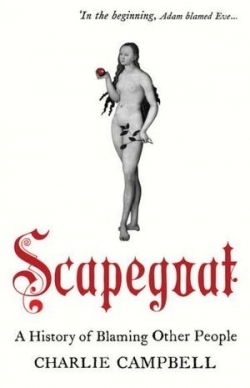Scapegoat
A History of Blaming Other People
“Essentially we are incapable of accepting that much of life is inexplicable. And so we use myth, art and religion as devices to explain and cope with reality.” Thus does English writer Charlie Campbell set the stage for his survey of scapegoating throughout human
history, whether it was Adam blaming Eve
for the loss of Eden (ignoring the fact that a supposedly all-powerful God set the whole thing up) or Hitler’s insane but politically astute blaming of Germany’s ills on the Jews. As the author appraises it, scapegoating can be a sincere but superstitious response to a perceived danger, a cynical manipulation of public discontent, or both.
Although these are not the author’s examples, one need look no further than the recent legislative assaults on suspected illegal immigrants in Arizona and Alabama to realize that people have made little progress in curbing their impulse to blame society’s troubles—real and imagined—on others.
Campbell, who is a former editor of The Literary Review, traces the practice of scapegoating from its inception as a tribal ritual that actually involved sacrificing animals to appease the gods through such other dark instances as the martyrdom of Christians, the centuries-long hounding of Jews, the persecution of “witches,” the use of “whipping boys” to take the blame and suffer the punishment for royal transgressors, the Moscow show trials of the 1930s, the personalizing of medical crises from ancient epidemics to the scourge of AIDS, and the American invasion of Iraq in response to a state of terrorism that country had no part in creating.
Campbell recognizes that women have always been among the most popular targets for scapegoating. Obviously, this has much to do with the sexual power women have over men. How can mortal beings that strong not partake of magic, and to what mischief can such sorcery lead? The story of mankind is a chronicle of the simultaneous adoration and suppression of women. Accused witches were said to have coupled with the Devil, made fields barren, led good men astray, and otherwise tampered with what might have been a perfect world.
America is now in the process of electing a president, and every candidate for that office is busy alerting the populace as to who the nation’s enemies are. There’s a name for that.
Reviewed by
Edward Morris
Disclosure: This article is not an endorsement, but a review. The publisher of this book provided free copies of the book to have their book reviewed by a professional reviewer. No fee was paid by the publisher for this review. Foreword Reviews only recommends books that we love. Foreword Magazine, Inc. is disclosing this in accordance with the Federal Trade Commission’s 16 CFR, Part 255.

